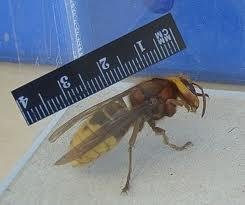We have redesigned our website
We are pleased that you chose to take a look at our training, but you have clicked on an old link. We have recently redesigned and updated our website.
You will find the same information - hopefully easier to read - on our new website: https://romseybeekeepers.com/?page_id=37 (or search for "Romsey Beekeeping Association" and follow the link on the home page.)
You will find the same information - hopefully easier to read - on our new website: https://romseybeekeepers.com/?page_id=37 (or search for "Romsey Beekeeping Association" and follow the link on the home page.)
About HORNETS - Like wasps but much larger
Most are our native European hornet, but be on the lookout for invading Asian hornetsClick on a picture in the line below to read about that topic
 SWARMS and PESTS - General help and information about honey bees whether swarming or in residence, and how to find help
SWARMS and PESTS - General help and information about honey bees whether swarming or in residence, and how to find help HORNETS are the largest European social wasp, usually 30-40 mm long
Our native hornet is the European hornet (Vespa crabro), Britain's largest insect of the wasp family although they are quite rare.
The smallest workers are bigger than the queens of most other species of wasp, and the queens are more than an inch long. They are easily identified by their size and their brown and orange-yellow stripes, whereas ordinary wasps are black and yellow. They live mostly in wooded areas in the south of England.
The smallest workers are bigger than the queens of most other species of wasp, and the queens are more than an inch long. They are easily identified by their size and their brown and orange-yellow stripes, whereas ordinary wasps are black and yellow. They live mostly in wooded areas in the south of England.
Like a wasp, but much bigger
The hornet's life cycle is similar to that of the common wasp. They build their nests out of 'paper' made from wood strips and saliva in hollow trees, chimneys, wall cavities, holes in banks etc.
Hornets have an unwarranted fearsome reputation because of their size and their loud hum, but in spite of that they are relatively docile and will rarely sting. If you are unlucky and are stung by a hornet, you will know about it!
Hornets have an unwarranted fearsome reputation because of their size and their loud hum, but in spite of that they are relatively docile and will rarely sting. If you are unlucky and are stung by a hornet, you will know about it!
Asian hornets - alien species!
The Asian hornet is a non-native species that is invading Europe. It is 'notifiable', which means that it must be reported if seen.
Please click here to read about this predator, how it could threaten our honey bees and what to do if you find one.
It is slightly smaller than our native hornet, and is easily identified by its yellow legs and much darker abdomen.For more information ,see the Non-Native Species Secretariat website
Please click here to read about this predator, how it could threaten our honey bees and what to do if you find one.
It is slightly smaller than our native hornet, and is easily identified by its yellow legs and much darker abdomen.For more information ,see the Non-Native Species Secretariat website
Discouraging hornets
When hornets are busy gathering woody material for their nests they chew and can damage wooden fences and garden furniture, and damage trees by stripping bark.
Paint or wood preservative discorages them but trees are harder to protect so sometimes the only solution is to locate and destroy the nest.
Contact Steve Smith at Cedar Pest (02380 739071 or 07976 425453 for advice. For full details please read our Swarms and pest control information
Paint or wood preservative discorages them but trees are harder to protect so sometimes the only solution is to locate and destroy the nest.
Contact Steve Smith at Cedar Pest (02380 739071 or 07976 425453 for advice. For full details please read our Swarms and pest control information







